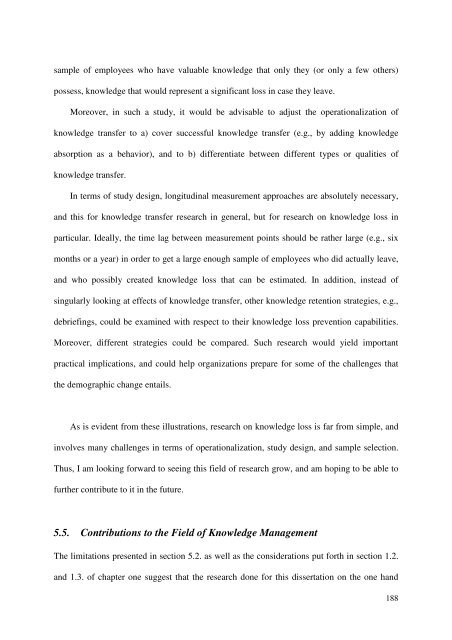thesis_Daniela Noethen_print final - Jacobs University
thesis_Daniela Noethen_print final - Jacobs University
thesis_Daniela Noethen_print final - Jacobs University
You also want an ePaper? Increase the reach of your titles
YUMPU automatically turns print PDFs into web optimized ePapers that Google loves.
sample of employees who have valuable knowledge that only they (or only a few others)<br />
possess, knowledge that would represent a significant loss in case they leave.<br />
Moreover, in such a study, it would be advisable to adjust the operationalization of<br />
knowledge transfer to a) cover successful knowledge transfer (e.g., by adding knowledge<br />
absorption as a behavior), and to b) differentiate between different types or qualities of<br />
knowledge transfer.<br />
In terms of study design, longitudinal measurement approaches are absolutely necessary,<br />
and this for knowledge transfer research in general, but for research on knowledge loss in<br />
particular. Ideally, the time lag between measurement points should be rather large (e.g., six<br />
months or a year) in order to get a large enough sample of employees who did actually leave,<br />
and who possibly created knowledge loss that can be estimated. In addition, instead of<br />
singularly looking at effects of knowledge transfer, other knowledge retention strategies, e.g.,<br />
debriefings, could be examined with respect to their knowledge loss prevention capabilities.<br />
Moreover, different strategies could be compared. Such research would yield important<br />
practical implications, and could help organizations prepare for some of the challenges that<br />
the demographic change entails.<br />
As is evident from these illustrations, research on knowledge loss is far from simple, and<br />
involves many challenges in terms of operationalization, study design, and sample selection.<br />
Thus, I am looking forward to seeing this field of research grow, and am hoping to be able to<br />
further contribute to it in the future.<br />
5.5. Contributions to the Field of Knowledge Management<br />
The limitations presented in section 5.2. as well as the considerations put forth in section 1.2.<br />
and 1.3. of chapter one suggest that the research done for this dissertation on the one hand<br />
188

















